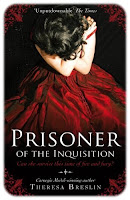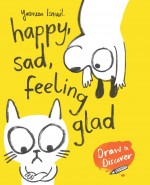Theresa Breslin
(Random House Children’s Books)
When young Zarita makes exaggerated accusations against a beggar to her Magistrate father, she cannot foresee that the catastrophic consequences will not only be instant but that they will also resonate for years to come. Her life is changed for ever, and so is the life of the beggar’s son, Saulo, who is sold as a slave to a merchant ship.
Years later, Zarita and Saulo’s paths cross again, unexpectedly so particularly for Saulo, who is desperate for revenge. But events soon take a turn for the worse, as these are dangerous times in Spain.
Master of historical fiction Theresa Breslin weaves another great tale with Prisoner of the Inquistion. Set in fifteenth century Spain at the time where King Ferdinand and Queen Isabella are using their Catholic faith as a tool to gather power and persecute minorities, in order to conquer the few remaining independent Spanish regions and create a united kingdom of Spain, this is a whirlwind of action, intrigue and good old star-crossed lovers. Narrated alternatively by both protagonists, this allows for great insight of life at the time at both extremes of society. It is quite violent to start with, and remains quite graphic throughout, but it is in no way gratuitous. These were dark, violent, scary times in Spain and therefore historical accuracy dictates it.
What I really enjoyed about this novel is its pace. I think historical settings in novels allow for plots full of deception and intrigue which would not work in any other genre and this also allows for a strong crescendo of pace as the story progresses, which keeps the reader entertained and on edge the whole way through.
The characters are particularly well-drawn, particularly the two protagonists who are having to deal with what life throws at them and are showing great strength of character. My favourite character remains Zarita’s aunt Beatriz who, throughout the book retains a stoical demeanour, yet is full of compassion as well as resolve and determination. Her bravery and utter devotion to Zarita had me crying at the end. The appearance of Christopher Columbus in the storyline was both surprising and intriguing. It brought contrast into the story: the small-mindedness and insularism of the Inquisition in contrast with Columbus’ dreams of the world, its vastness, the cultural differences that we can embrace; I guess it shows how paradoxical things were at the time: the excitement of new discoveries alongside the old Catholic ways. I very much enjoyed this, but I can’t help but wonder how accurate Columbus’ depiction is. I am not trying to doubt Breslin’s ability as a historical writer, but was just rather surprised at how jolly he was! I assumed, possibly wrongly, that someone who has achieved so much would be rather ruthless.
I really enjoyed Prisoner of the Inquisition; I knew very little of the Spanish Inquisition and was enthralled by the historical side of the story. But the intrigue, the suspense and dramatic turns of Zarita and Saulo’s lives allowed this novel to be not only a very good historical novel but also a gripping, exciting story.






I like historical novels and haven’t read anything directly about the Inquisition. This looks interesting.
Thanks
Lynn
I know very little about this time period and hadn’t read anything by Theresa Breslin before, but I’m reading Prisoner of the Inquisition at the moment and really enjoying it. So I’m glad to see a great review of it 🙂
Theresa Breslin is my favourite historical YA writer. The Medici Seal is my favourite. I am so glad that this was shortlisted for the Carnegie. It is nice to see one of my favourite authors get some attention. Great review.
It is definitely worth reading! I had never read any Theresa Breslin, and I was hooked. It is intelligent writing, but still accessible. :0)